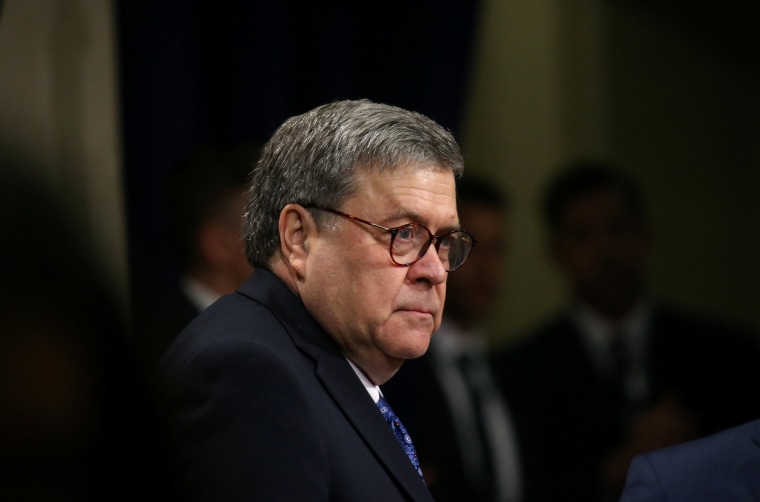Attorney General William Barr said in an interview airing Friday that the point of the Justice Department probe into the origins of the federal investigation into Russian election interference is to determine “whether government officials” abused “their power and put their thumb on the scale.”
"I’ve been trying to get answers to the questions and I've found that a lot of the answers have been inadequate and some of the explanations I've gotten don't hang together,” Barr said in an interview with Fox News.
“In a sense I have more questions today than when I first started,” he added.
Barr said that “people have to find out what the government was doing during that period,” adding that, “if we're worried about foreign influence, for the very same reason we should be worried about whether government officials abuse their power and put their thumb on the scale.”
"I'm not saying that happened but it's something we have to look at,” he said.
In April, Barr said he was "reviewing the conduct" of the FBI's Russia probe during the summer of 2016, and that the Department of Justice inspector general would release a report on the FBI's use of the Foreign Intelligence Surveillance Act process and other matters in the Russia case in May or June.
President Donald Trump and Republicans in Congress have long argued that the Russia investigation had its origins in a group of biased FBI leaders who bore animosity toward Trump, including then-Director James Comey and Deputy Director Andrew McCabe. Both men have denied that they acted out of any bias, saying there was a trail of evidence of Trump campaign contacts with Russians they would have been negligent not to follow.
The inspector general, Michael Horowitz, has been looking into how the FBI obtained a warrant in October 2016 to monitor the communications of Carter Page, a former foreign policy adviser to the Trump campaign who had traveled to Russia and had previously been the target of recruitment by Russian intelligence officers.
The Russian investigation, however, wasn't launched because of Page, for whom four different judges, all appointed by Republican presidents, signed off on electronic surveillance. Rather, the probe's origins were linked to a meeting that another former Trump campaign adviser George Papadopoulos had with a professor with ties to Russian intelligence
Barr testified before a Senate Appropriations subcommittee last month that he was reviewing whether federal authorities spied on the Trump campaign, saying he thought they had.
"I think spying did occur," he said. "The question is whether it was adequately predicated."
Barr said during his interview Friday that, "We're going to find out when it started."
Trump reiterated Barr's claim Friday morning, shortly before Barr's interview aired, tweeting that his "Campaign for President was conclusively spied on."
"A really bad situation. TREASON means long jail sentences, and this was TREASON!" he added.
According to The New York Times, Barr has also has assigned John Durham, the top federal prosecutor in Connecticut, to review the FBI's decision to open a counterintelligence investigation into alleged ties between Trump associates and Russia's efforts to interfere in the 2016 presidential election. NBC News has not independently verified The Times' report.
The FBI and other law enforcement agencies have consistently defended the Russia investigation, which culminated in special counsel Robert Mueller's report in March. The report found "sweeping" and "systematic" Russian interference in the election and identified links between Trump campaign officials and figures associated with the Russian government. But investigators did not establish that Trump's team "conspired or coordinated with the Russian government in its election interference activities," despite numerous contacts.
Mueller's 448-page report also detailed Trump's attempts to disrupt the investigation, as well as the decision not to charge the president with obstruction of justice in part because there was no underlying crime and many of the attempts were carried out in plain view.
But Mueller said that the decision not to charge Trump was a difficult one, and that it was not clear he was innocent of obstructing justice. If the special counsel's office had been certain that Trump did not commit crimes, Mueller said, it would have said so in the report.

